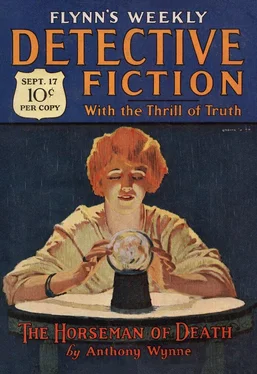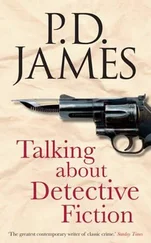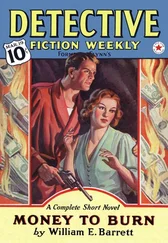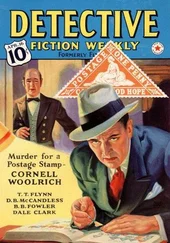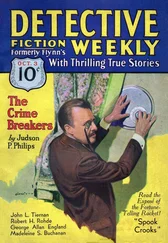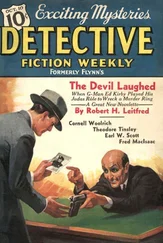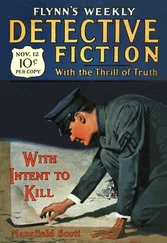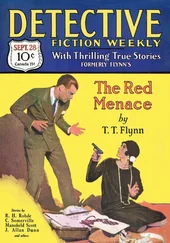Valentine - Flynn’s Weekly Detective Fiction. Vol. 27, No. 1, September 17, 1927
Здесь есть возможность читать онлайн «Valentine - Flynn’s Weekly Detective Fiction. Vol. 27, No. 1, September 17, 1927» весь текст электронной книги совершенно бесплатно (целиком полную версию без сокращений). В некоторых случаях можно слушать аудио, скачать через торрент в формате fb2 и присутствует краткое содержание. Город: New York, Год выпуска: 1927, Издательство: The Red Star News Company, Жанр: Детектив, на английском языке. Описание произведения, (предисловие) а так же отзывы посетителей доступны на портале библиотеки ЛибКат.
- Название:Flynn’s Weekly Detective Fiction. Vol. 27, No. 1, September 17, 1927
- Автор:
- Издательство:The Red Star News Company
- Жанр:
- Год:1927
- Город:New York
- ISBN:нет данных
- Рейтинг книги:5 / 5. Голосов: 1
-
Избранное:Добавить в избранное
- Отзывы:
-
Ваша оценка:
- 100
- 1
- 2
- 3
- 4
- 5
Flynn’s Weekly Detective Fiction. Vol. 27, No. 1, September 17, 1927: краткое содержание, описание и аннотация
Предлагаем к чтению аннотацию, описание, краткое содержание или предисловие (зависит от того, что написал сам автор книги «Flynn’s Weekly Detective Fiction. Vol. 27, No. 1, September 17, 1927»). Если вы не нашли необходимую информацию о книге — напишите в комментариях, мы постараемся отыскать её.
Flynn’s Weekly Detective Fiction. Vol. 27, No. 1, September 17, 1927 — читать онлайн бесплатно полную книгу (весь текст) целиком
Ниже представлен текст книги, разбитый по страницам. Система сохранения места последней прочитанной страницы, позволяет с удобством читать онлайн бесплатно книгу «Flynn’s Weekly Detective Fiction. Vol. 27, No. 1, September 17, 1927», без необходимости каждый раз заново искать на чём Вы остановились. Поставьте закладку, и сможете в любой момент перейти на страницу, на которой закончили чтение.
Интервал:
Закладка:
Disdainfully the police executive replied:
“I understand you were walking with Mr. Balcolm when they got him,” he said. “If you don’t know how it happened, how in the hell do you expect the police department to know it?”
“I’m not a policeman,” the other retorted.
“That’s right,” the commissioner sneered. “ You’re not. From the way you’ve been trying to run the department I thought you might have been.”
They removed the banker’s body to his late home immediately, and police headquarters hummed with activity all night. All suspects, all known police characters were rounded up and brought down to Center Street for questioning before they were released.
It was a brave gesture, but the erudite Druggan could have told you before it was done that they would not get their man that night. Its end found him sitting in his office, weary and beaten.
Chapter VI
From Dead Hands
When Barrow arose the morning after the Balcolm murder he had heard nothing of the Garden stabbing. A glance at the first page of the Sphere told him enough, however, to send him winging for the Citadel’s offices. He had reason to suspect that the mystery man’s stiletto had struck heavily into the company’s strong box this time.
He immediately entered Gresham’s office and found the chief of claims eagerly examining records.
The old man gruffed a greeting and continued his calculation. Presently he looked up and passed a memorandum to Barrow.
“That’s all it means to us,” he said, his voice trembling.
The investigator looked at the penciled notation and sat down heavily in the nearest chair.
“Whew!” he exclaimed. “Are you sure you’re right, Mr. Gresham?”
A nod from the gray head at the other side of the desk.
“Can’t be mistaken,” Gresham verified. “Eight hundred thousand. We had him for four hundred thousand dollars straight, and it was double indemnity.”
He leaped to his feet.
“Barrow,” he said, “this is not my money, and the Citadel recognizes its obligations to the extent of wanting to pay just claims, but this thing is getting too damned costly.”
The investigator waited respectfully for the chief to finish.
“The police are supposed to suppress murderers. We rely upon them to do that. But the Citadel is certainly entitled to some representation in this man-hunt, I’m thinking. I want you to go out after this fellow. Get him.”
Barrow was not keen about this.
“Thanks for the compliment, chief. That’s not as easy as it sounds. All the detectives in New York have been trying to for a long time.”
Gresham nodded.
“I know they have,” he said, “and I think they’ve tried hard enough, but they haven’t done it. I think you can. Take as long as you like. But get him.”
Gresham turned away, and Barrow knew further parley was unnecessary.
The chief of claims had unbounded faith in his star investigator, a faith built up by Barrow himself, and it did not occur to him that his man could fail.
So Barrow sallied forth on his toughest assignment.
“To begin with,” he told himself, “I’m going to do something now that I never have done before, and hope I never have to do again.”
And he went up to police headquarters and borrowed a pistol from Druggan.
To the captain of detectives he told the story of Balcolm’s insurance and how Gresham had assigned him to run down the mystery killer.
Druggan smiled wanly.
“I feel as weak as a woman,” he told Barrow, “and God knows if you can land this fellow the police department will owe you a vote of everlasting gratitude. You know how we stand.”
Barrow nodded.
“I know,” he said, “and I’m as much up a tree as you are.”
“How are you going after him?” Druggan asked.
The Citadel man had to concede his lack of an idea on this subject.
“I guess I’ll just have to dope it out,” he told the other.
After a general discussion, during which he learned that the Garden killing had produced not the slightest clew, and that it was considered by the police as a gesture of defiance on the part of the “There Is” killer, Barrow left headquarters for his home, where he proposed to consider quietly the entire mystery from its beginning and then to proceed carefully from that point.
This was orthodox with Barrow. He had never made claim to greatness as a detective. But he had often given it as his conviction that the only logical way to investigate anything was from its genesis.
This fixed the starting point squarely upon the last day of Dave Gulliver’s life. Whatever had occurred later, the mystery outlaw’s depredations had begun with the deadly attack on the writer, and it was there, Barrow reasoned, that it would be well to begin his study.
He was reasonably certain that robbery had not been the original motive, for in each killing none of the victims had been searched.
“Druggan and his crowd can have their own opinion,” he told himself, “but I can’t see anything but a mad man in action here. What could Gulliver and Tasney have done to have stirred up hatred of so pronounced a type? And then there was old Balcolm, killed just because he demanded that the murderer be caught.”
Another consideration was carefully weighed by the Citadel man. Who but a crazy man would stage the killings so openly?
“It must be,” he finally concluded, “that Gulliver in some way offended somebody, either the killer or one of his friends. They might have tried blackmail. At any rate, we’ll find out about that phase.”
He telephoned to Mrs. Gulliver almost immediately and told her of his mission. She, hopeful that this might be the beginning of an investigation that would bring her husband’s slayer to justice, readily assented when he asked if he might see her.
Barrow explained his theory to the widow.
“I should like, if possible,” he suggested, “to see Mr. Gulliver’s most recent correspondence. Is it available? Did he keep a file?”
“Always,” she said, “and there’s no objection to your seeing it.”
She had put the writer’s records away, and now brought them out for the inspection of the Citadel man. There were no letters that would indicate alliances unknown to her, nothing to suggest blackmail or a quarrel of any sort.
She was examining some of the carbon copies of her husband’s stories as Barrow finished looking over the letters.
“Hello,” she suddenly observed, as she held one of the stories before her. “This is one I haven’t seen and know nothing about.”
Barrow was alert.
“A story?” he asked.
“Yes. It’s called ‘Power.’ I didn’t know he had done it. He wasn’t paid for it, at any rate. I know that.”
“Who has the original?” Barrow asked.
Mrs. Gulliver arose and walked over to a small cabinet on a near-by desk. There she opened a card index drawer. Gulliver was that methodical about his work.
“Let’s see,” she said softly. “ ‘Power.’ Here it is.”
There was a pause.
“Why,” she gasped as she turned to the Citadel man, “he was — why — oh, that can’t be — why—”
She was weeping, and Barrow crossed the room and took the card from her hand. There, written in Gulliver’s hand was the notation:
“Taken by hand to Parkinson, editor Master Sleuth. May 5, 19—”
It was Barrow’s turn to register the amazement he felt.
“Why,” he said, “he must have had it with him the morning he was — the morning it happened.”
“He did,” she breathed.
Barrow nodded.
“But it wasn’t found by the police,” he said. “Perhaps he mailed it instead.”
Читать дальшеИнтервал:
Закладка:
Похожие книги на «Flynn’s Weekly Detective Fiction. Vol. 27, No. 1, September 17, 1927»
Представляем Вашему вниманию похожие книги на «Flynn’s Weekly Detective Fiction. Vol. 27, No. 1, September 17, 1927» списком для выбора. Мы отобрали схожую по названию и смыслу литературу в надежде предоставить читателям больше вариантов отыскать новые, интересные, ещё непрочитанные произведения.
Обсуждение, отзывы о книге «Flynn’s Weekly Detective Fiction. Vol. 27, No. 1, September 17, 1927» и просто собственные мнения читателей. Оставьте ваши комментарии, напишите, что Вы думаете о произведении, его смысле или главных героях. Укажите что конкретно понравилось, а что нет, и почему Вы так считаете.
